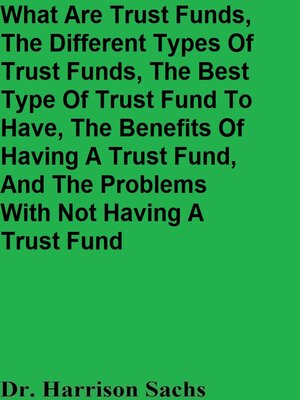What Are Trust Funds, the Different Types of Trust Funds, the Best Type of Trust Fund to Have, the Benefits of Having a Trust Fund, and the Problems With Not Having a Trust Fund
ebook
By Dr. Harrison Sachs

Sign up to save your library
With an OverDrive account, you can save your favorite libraries for at-a-glance information about availability. Find out more about OverDrive accounts.
Find this title in Libby, the library reading app by OverDrive.



Search for a digital library with this title
Title found at these libraries:
| Library Name | Distance |
|---|---|
| Loading... |
This essay sheds light on what are trust funds, demystifies the different types of trust funds, reveals the best type of trust fund to have, identifies the benefits of having a trust fund, and explicates the problems with not having a trust fund. Unbeknownst to most people, a trust fund refers an entity that is established by a trustor for the purpose of providing financial security to the beneficiaries of the trust. The assets of the trust fund are transferred to the trustee by the trustor of the trust. The trustee of the trust manages the trust fund's assets and is responsible for carrying out the directives of the trust. The trustee of the trust should act in the trust's best interest and should not renege on carrying out the directives of the trust. The trustee of the trust is entrusted with the responsibility of doling out the assets of the trust to the beneficiaries of the trust in accordance with the directives of the trust. The beneficiaries of the trust receive the assets from the trust fund. The assets that comprise a trust fund typically consist of investment securities and fiat currency. The assets that comprise a trust fund however can consist of other types of assets and are not limited to just consisting of investment securities and fiat currency. The assets that comprise a trust fund can for instance also consist of real estate proprieties, businesses, and life insurance policies. Prospective trustors will often procure the services of a trust attorney to assist them with establishing trusts. The perquisites of establishing a trust can vary from trust to trust. Succinctly stated, a trust fund can be deemed an entity that holds assets of the trust. A trust fund is often replete with assets. The beneficiaries of the trust receive the assets from the trust fund which allows them to amplify their wealth. The parties of a trust fund encompass the beneficiaries, trustee, and trustor. The trustor of the trust establishes the terms appertaining to the distribution of the assets of the trust fund. The trustee is expected to dole out the assets of the trust fund to the beneficiaries of the trust based on the terms stipulated in the trust agreement. There are an exorbitant amount of disparate types of trust funds. The type of trust funds are not limited to being revocable trust funds and irrevocable trust funds. Other types of trust funds encompass the Spendthrift Trust Fund, the Testamentary Trust Fund, the "Qualified Personal Residence Trust" Fund, the Land Trust Fund, the "Grantor Retained Annuity Trust" Fund, the Asset Protection Trust Fund, the Blind Trust Fund, the Charitable Remainder Trust Fund, the Generation-Skipping Trust Fund, the "Individual Retirement Account (IRA) Trust" Fund, the "Qualified Terminable Interest Property Trust" Fund, the Totten Trust Fund, and the Marital Trust Fund. One of the primary types of trust funds are irrecoverable trust funds. An irrevocable trust "refers to a type of trust where its terms cannot be modified, amended, or terminated without the permission of the trustor's beneficiary or beneficiaries. The grantor, having effectively transferred all ownership of assets into the trust, removes all of their rights of ownership to the assets and the trust". An irrecoverable trust cannot be modified once it is established. The assets of an irrecoverable trust fund are transferred by the trustor to the trustee of the trust. The trustee of the irrecoverable trust manages the trust fund's assets and is responsible for carrying out the directives of the irrecoverable trust. The trustee of the irrecoverable trust should act in the trust's best interest and should not renege on carrying out of the directives of the trust. The trustee of the...







